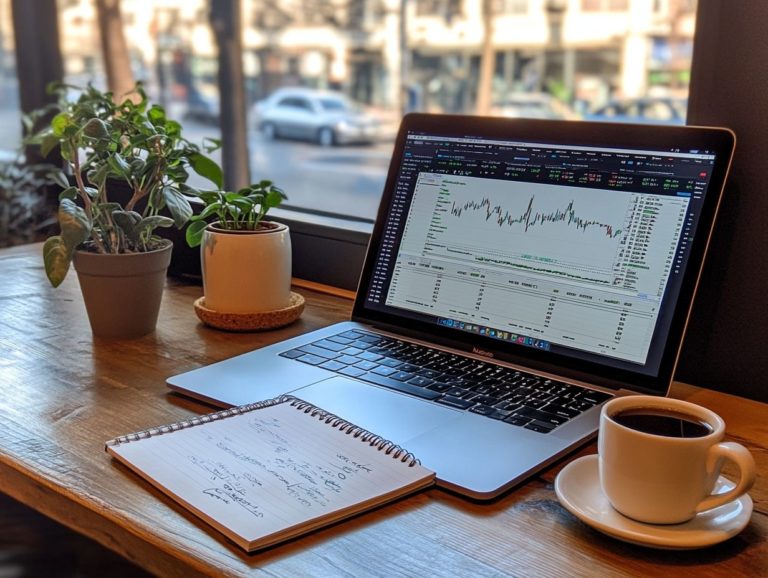The Role of Philosophy in Trading Psychology
Trading transcends mere numbers and charts; it is profoundly intertwined with mindset and psychology. This article delves into how philosophical principles influence your thoughts, decisions, and reactions in the market. By exploring various schools of thought and integrating personal values into your trading strategies, you ll uncover the intricate relationship between philosophy and trading psychology.
The discussion focuses on the essential role of emotional management and guides you in cultivating a personal trading philosophy that resonates with your goals. Get ready to transform your trading approach today!
Contents
- Key Takeaways:
- Understanding the Mindset of Traders
- The Influence of Philosophy on Trading Psychology
- Applying Philosophy to Trading Strategies
- The Importance of Emotional Management in Trading
- Developing a Personal Philosophy for Trading
- Frequently Asked Questions
- How Can Philosophy Shape Your Trading Mindset?
- How Can Philosophy Help Traders Improve Their Performance?
- Key Philosophical Concepts Relevant to Trading Psychology
- Is a Philosophical Foundation Necessary for Trading Success?
- Integrating Philosophy into Trading Strategies
- Relevant Philosophers and Schools of Thought
Key Takeaways:

- Philosophy shapes our mindset as traders and impacts our decision-making process.
- Incorporating philosophical principles in trading strategies can improve decision-making and emotional management.
- Developing a personal philosophy for trading, based on personal values and beliefs, can lead to more consistent and successful trading.
Understanding the Mindset of Traders
Understanding the mindset of traders is essential for elevating trading performance. It involves a range of psychological factors that shape decision-making, including the mental shortcuts we use that can lead us to make poor decisions and the ability to stay calm and focused despite stress.
By exploring the nuances of trading psychology, you can uncover the behavioral finance principles that influence market participants. This knowledge allows you to navigate the complexities of financial markets with greater finesse, ultimately sharpening your investment decisions and enhancing your overall success.
The Influence of Philosophy on Trading Psychology
The influence of philosophy on trading psychology is remarkably significant. Various philosophical schools of thought, like Stoicism, offer invaluable insights into managing emotions and developing the ability to stay calm and focused despite stress. This can greatly enhance your disciplined behavior, particularly in the face of market volatility.
By integrating these philosophical principles into your approach, you can cultivate a mindset that promotes rational decision-making even amid unpredictable market movements and fluctuations. This, in turn, paves the way for more successful trading outcomes.
Exploring Different Philosophical Schools of Thought
Exploring various philosophical schools of thought unveils a rich tapestry of insights that can elevate your trading psychology. The teachings of Stoic philosophy emphasize rationality, emotional resilience, and disciplined behavior, offering you a solid foundation to navigate the emotional landscape of trading.
By embodying Stoic principles, you can cultivate a mindset that lessens the influence of external events on your emotional state. For example, when faced with a sudden market downturn, a Stoic trader takes a moment to reflect on what lies within their control versus what does not. This pause allows them to respond with clarity rather than succumbing to panic.
By emphasizing the acceptance of circumstances and focusing on rational thought, you can build resilience against fear and greed, leading to more thoughtful and deliberate choices. This ultimately fosters long-term success in your trading endeavors.
Applying Philosophy to Trading Strategies

Applying philosophy to your trading strategies can greatly elevate your ability to manage emotional responses and refine your decision-making processes. Ultimately, this results in improved performance outcomes.
By anchoring your strategies in philosophical principles, you can cultivate disciplined behavior that enables you to navigate the unpredictable landscape of financial markets while minimizing the influence of cognitive and emotional biases.
Utilizing Philosophical Principles in Decision Making
Using philosophical principles can empower you as a trader. It enhances your trading psychology, builds emotional resilience, and sharpens your judgment during market fluctuations.
This approach invites you to embrace rational thought processes, which help mitigate the influence of thinking errors and emotional reactions that often lead to impulsive decisions.
By drawing on concepts like stoicism, you can learn to detach from the emotional turbulence of the markets. Practicing mindfulness helps you remain composed in the face of sudden price shifts, enabling you to make thoughtful decisions instead of reactive ones.
Applying the principle of deliberative reasoning cultivates a habit of weighing evidence against feelings. This helps identify tendencies like overconfidence or loss aversion. These mindful techniques not only strengthen your emotional resilience but also boost your overall trading performance by promoting more objective analyses of your trades.
The Importance of Emotional Management in Trading
The significance of emotional management in trading is paramount. Mastering your emotional responses to market fluctuations is integral to both trading psychology the way emotions affect trading decisions and effective risk management.
When you cultivate emotional resilience and adhere to disciplined behaviors, you position yourself to adeptly navigate the inevitable volatility of financial markets. This approach can supercharge your investment decisions and elevate your overall performance outcomes.
Controlling Emotions and Impulses
Controlling your emotions and impulses is crucial for enhancing your trading psychology. When unchecked, emotional responses can lead to irrational decisions that undermine your performance outcomes.
By developing emotional resilience, you can better manage those impulses. This enables a more objective analysis of market movements and ultimately improves your decision-making.
To achieve this, consider employing techniques like practicing mindfulness. This cultivates awareness and helps you recognize emotional triggers before they escalate.
Setting clear trading goals and sticking to a well-defined strategy can act as anchor points during turbulent market fluctuations.
Journaling your experiences serves as a powerful tool for reflection. It allows you to evaluate past decisions and emotions, leading to more informed choices in the future.
Integrating these strategies into your trading routine can establish a disciplined approach that enhances your performance and contributes to long-term success in the unpredictable world of finance.
Developing a Personal Philosophy for Trading

Developing a personal philosophy for trading is a transformative journey that can profoundly elevate your trading psychology.
By aligning your emotional responses, values, and beliefs with your trading plan, you cultivate disciplined behavior that is crucial for success.
A well-defined personal philosophy acts as a guiding framework, giving you the power to navigate the complexities of financial markets while keeping your eyes firmly on your long-term investment strategies.
Incorporating Personal Values and Beliefs
Incorporating your personal values and beliefs into your trading is crucial. It enhances your trading psychology and emotional management.
This alignment helps you make decisions that resonate with your core principles, fostering a deeper self-awareness. With this clarity, you can navigate market fluctuations while keeping your long-term goals and performance outcomes firmly in sight.
Reflecting on what truly matters to you cultivates a mindset that boosts your confidence and reduces the likelihood of impulsive decisions driven by fear or greed.
Understanding your values equips you with better emotional regulation. This enables you to maintain composure during unstable market situations.
When you remain grounded in your beliefs, you re more inclined to adhere to well-defined strategies rather than chasing fleeting trends. This ultimately leads to improved consistency and resilience in your trading approach.
Transform your trading game with powerful self-reflection! Such thoughtful self-reflection establishes your methodology as a fundamental practice for achieving sustained success in the trading arena.
Frequently Asked Questions
How Can Philosophy Shape Your Trading Mindset?
The role of philosophy in trading psychology is to provide a framework for understanding and managing the psychological aspects of trading. It helps traders develop a clear set of beliefs and principles that guide their decision-making and behavior in the markets.
How Can Philosophy Help Traders Improve Their Performance?

Philosophy can help traders improve their performance by promoting self-awareness, discipline, and rational thinking. It encourages them to reflect on their actions, identify patterns and biases, and make informed decisions based on logic rather than emotions.
Key Philosophical Concepts Relevant to Trading Psychology
Some key philosophical concepts relevant to trading psychology include stoicism, rationalism, and existentialism. These philosophies focus on self-control, reason, and personal responsibility key factors for trading success.
Is a Philosophical Foundation Necessary for Trading Success?
No, having a philosophical foundation is not necessary to be a successful trader. However, it can greatly benefit traders by providing them with a solid understanding of their own beliefs and values, as well as the ability to handle the psychological challenges of trading.
Integrating Philosophy into Trading Strategies
Traders can integrate philosophy into their trading strategies by incorporating philosophical principles and concepts into their decision-making process. This involves setting clear goals and values, developing a trading plan based on reason and logic, and practicing self-reflection and discipline.
Relevant Philosophers and Schools of Thought
Many philosophers and schools of thought can be relevant to trading psychology, as different traders may find different philosophies helpful. Some commonly referenced philosophers include Marcus Aurelius, Nassim Taleb, and Friedrich Nietzsche.






